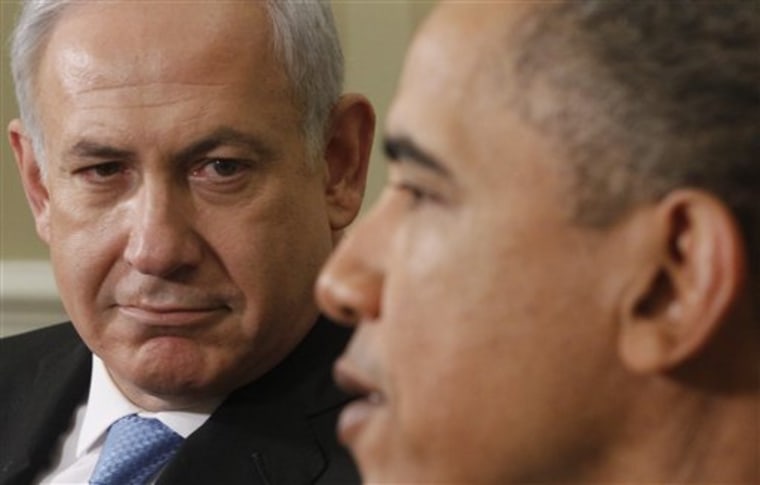President Barack Obama warned America's pro-Israel lobby on Sunday that the Jewish state will face growing isolation without a credible Middle East peace process. He defended his endorsement of a future Palestine based on Israel's 1967 boundaries but subject to negotiated land swaps as a public expression of long-standing U.S. policy.
After a contentious couple of days, Obama sought to alleviate concerns that his administration was veering in a pro-Palestinian direction by placing Thursday's major Mideast policy speech in the context of Israel's security. He told the American Israel Public Affairs Committee that the border lines he referred to reflected U.S. thinking dating back to President Bill Clinton, and that it needed to be brought out into the open.
"If there's a controversy, then it's not based in substance," Obama said in a well-received speech at a Washington convention center. "What I did on Thursday was to say publicly what has long been acknowledged privately. I have done so because we cannot afford to wait another decade, or another two decades, or another three decades, to achieve peace."
The event was eagerly anticipated after Obama outlined his vision for the changing Middle East on Thursday at the State Department and then clashed in a White House meeting with Israeli Prime Minister Benjamin Netanyahu on Friday.
Netanyahu said in a statement after Obama's remarks that he supported Obama's desire to advance peace and resolved to work with the president to find ways to renew the negotiations. "Peace is a vital need for us all," he said.
The prime minister will address the pro-Israel lobby Monday and Congress on Tuesday.
Obama didn't back off from any of his earlier comments about what it would take to reach a two-state solution between Israelis and Palestinians. Repeating a large section of his Thursday speech, he said the result must be derived through negotiation, and that provisions must ensure Israeli border security and protections from acts of terrorism. An Israeli withdrawal from territory should be followed by Palestinians taking responsibility for security in a nonmilitarized state.
"By definition, it means that the parties themselves - Israelis and Palestinians - will negotiate a border that is different than the one that existed on June 4, 1967," Obama said. That was before Israel seized the West Bank, Gaza Strip and East Jerusalem.
"It is a well-known formula to all who have worked on this issue for a generation," the president said. "It allows the parties themselves to account for the changes that have taken place over the last 44 years, including the new demographic realities on the ground and the needs of both sides."
Obama made a big effort to soothe any fears about his commitment to Israel's security. His emphasis on what the 1967 borders — with mutually agreed land swaps — would mean reflected a part of the equation that Netanyahu largely disregarded. And he said U.S. support for Israel's long-term security would never waver.
But Obama also stressed that peace efforts needed to gain ground quickly.
"The march to isolate Israel internationally — and the impulse of the Palestinians to abandon negotiations — will continue to gain momentum in the absence of a credible peace process and alternative," he said.
The talk last week of the 1967 borders prompted bitter criticism from Netanyahu. He called the demarcation "indefensible" and issued a flat rejection of the idea, in a blunt display of differences after his meeting with Obama.
Netanyahu, who will address the pro-Israel lobby Monday and Congress on Tuesday, played down the rift.
"The disagreements have been blown way out of proportion," he told The Associated Press on Saturday. "It's true we have some differences of opinion, but these are among friends."
Chief Palestinian negotiator Saeb Erekat refused to address some of the issues raised by Obama, including his criticism of a reconciliation agreement between President Mahmoud Abbas' U.S.-backed government and the Islamic militant group Hamas. He also declined to react to Obama's strident rejection of Palestinian efforts to win U.N. recognition of an independent Palestinian state without a peace deal with Israel.
"I want to hear from Mr. Netanyahu," Erekat said, calling for the Israeli leader to conduct peace talks according to the principles Obama laid out. "Before he says yes, it's a waste of time to talk about a peace process. We are waiting for him to respond to the president."
Obama was to depart later Sunday for Ireland. He will also visit England, France and Poland this week.
The trip comes amid the continued NATO-led bombing campaign in Libya and a seemingly intractable conflict between Moammar Gadhafi's forces and Libyan rebels. Talks will also encompass economic concerns, as European countries make stark cuts in public spending and Obama and congressional Republicans try to hash out how to cut spending to bring U.S. debt under control.
___
Associated Press writers Amy Teibel in Washington and Karin Laub in Ramallah, West Bank, contributed to this report.
